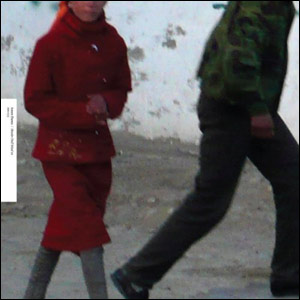by Kevin J. Elliott
While we here at the Agit Reader are always staunch supporters of the quality product bestowed upon us by the formidable Sacred Bones label, not everything is golden. Recently a micro-blog in some altered zone wrote a ho-hum review of the Bitters’ new 12-inch, but still referred to it as essential, all because of the fine care put into the artwork of each Sacred Bones release. I can contest that they put that extra bit of elbow grease into everything that leaves their headquarters, but keeping a record around just to look at and admire is not how we operate. No ill will towards the Bitters or Mac Blackout (by all means, put them in your collection), but I’d rather save the words and endorse the cream of the label’s late summer crop. Both of these are essential and it’s not just because you can hang them on the wall next to your Cy Twombly prints. Alas...

Amen Dunes, Murder Dull Mind
Despite most musicians these days shrugging off environment as shaping their sounds, there’s some serious psychogeography in Amen Dunes’ debut for Sacred Bones, Murder Dull Mind. Who knows Damon McMahon’s competency of language when he recorded the entirety an expat in a North Beijing apartment? He could have wholly adapted a grad student in Madarin, but there’s no denying the culture shock, or better yet, the unique sense of isolation (not loneliness) that informs the slightly askew acoustic meanderings and vocal throes cobbled in his songs. Folk as it may be—a few tunes here, such as the title track and “Night Driver Sunriser” could even be mistaken for the elegance and starkness of indie crooner fluff like Bon Iver and the Tallest Man Alive—it never stays within those parameters. “Diane,” for example, is constantly ambling, as if McMahon is continually weaving in and out of different crowds until he finds the right fit. Trouble is it’s an existential quest, but never for naught, because as “Diane” grows increasingly oblique in that search, it also becomes hypnotic, challenging pop, riding tumbleweed strumming and condensation drone. Imagine Skip Spence’s Oar as Eastern funeral chant. Murder Dull Mind is the first time in a while I was genuinely pleased a record so short felt so endless. Not noticing McMahon’s subtle shifts and melodic angles is part of his reward, as the more one listens, the more those nuances rise to the surface and you can see his compositions collect various bits of insulating sparks of influence—be it tattered Beatles mysticism or post-apocalyptic industrial sheet music that kept him company during his communique-less sojourn. Under a microscope, it may even be construed as a cruel, still enjoyable, game. The final laugh, “Yur a Liar” takes a few minutes to reveal it’s actually a contained epic, splicing together a handful of spontaneous hooks into a wild goose chase for the chorus.

The Electric Bunnies, “Pretty Joanna” b/w “I Swear I’ll Never Let You Go”
Unlike the Bitters, who have crossed the tolerability threshold with one too many releases, you can never have enough of Miami, Florida’s Electric Bunnies. That’s probably due to the fact that—even taking into consideration the fact that last year’s Through the Magical Door was their coming out party—they don’t do a whole lot of border crossing or interviews or picture taking or public relations to cajole in the “cave pop” scene of their inferiors. Truly, we could call them the “thinking man’s Smith Westerns,” but that might be construed as a knock. Every release comes across as an experiment, a new direction even when’s it’s simple to see upon which toadstools the Bunnies have been hopping to cross the street each time. That void in the spotlight also accents the twee-tinged artwork painting their imagined universe. This time, in two songs and a cutesy cover inhabited by big-headed children, rainclouds and swelling hearts, it’s a universe filled with love letters. “Pretty Joanna” was written with a PS to Psychocandy. Choked with reverb and ominous guitar buzz, it patiently inflates into an anthem that might herald the start of a mountainous album. It lifts from melancholic terrain into the night sky, looking towards blackhole forever; they could likely pound this out all night. The B-side, “I Swear I’ll Never Let You Go,” is opposite and more terrestrial by design. Given the genre-shifting, fidelity-fickle nature of the Bunnies, the song is a forgotten gem from four-track follies or, again, a newly printed proclamation to the Elephant Six, especially those Gerbils. But with no time or collective to vine it in wild Southern psychedelic baubles, the Bunnies get to the heart, then to the skeleton, freebasing their aura instead and blowing it out in puffs of gray smoke. There is color in their world—they’re just saving it up for a drought.
PRIMITIVE FUTURES
An Interview with Fabulous Diamonds
Welcome Home/Diggin' the Universe: A Woodsist Compilation
Top 10 Artifacts for the First Half of 2010
Knowing the Unknown
Naked on the Vague, Heaps of Nothing
Knight School, Revenger
Florida's Dying Party Platter
Introducing... Fey Gods
Getting into Nerve City
Hozac Hookup Klub's Final Hookup
Psychedelic Horseshit, Acid Tape
The Whines, Hell to Play
Introducing... Mount Carmel
Ron House, Blind Boy in the Back Seat
